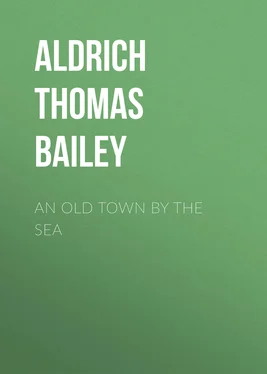Thomas Aldrich - An Old Town By the Sea
Здесь есть возможность читать онлайн «Thomas Aldrich - An Old Town By the Sea» — ознакомительный отрывок электронной книги совершенно бесплатно, а после прочтения отрывка купить полную версию. В некоторых случаях можно слушать аудио, скачать через торрент в формате fb2 и присутствует краткое содержание. Жанр: foreign_prose, История, foreign_edu, foreign_antique, на английском языке. Описание произведения, (предисловие) а так же отзывы посетителей доступны на портале библиотеки ЛибКат.
- Название:An Old Town By the Sea
- Автор:
- Жанр:
- Год:неизвестен
- ISBN:нет данных
- Рейтинг книги:5 / 5. Голосов: 1
-
Избранное:Добавить в избранное
- Отзывы:
-
Ваша оценка:
- 100
- 1
- 2
- 3
- 4
- 5
An Old Town By the Sea: краткое содержание, описание и аннотация
Предлагаем к чтению аннотацию, описание, краткое содержание или предисловие (зависит от того, что написал сам автор книги «An Old Town By the Sea»). Если вы не нашли необходимую информацию о книге — напишите в комментариях, мы постараемся отыскать её.
An Old Town By the Sea — читать онлайн ознакомительный отрывок
Ниже представлен текст книги, разбитый по страницам. Система сохранения места последней прочитанной страницы, позволяет с удобством читать онлайн бесплатно книгу «An Old Town By the Sea», без необходимости каждый раз заново искать на чём Вы остановились. Поставьте закладку, и сможете в любой момент перейти на страницу, на которой закончили чтение.
Интервал:
Закладка:
Thomas Bailey Aldrich
An Old Town By the Sea
Thou singest by the gleaming isles,
By woods, and fields of corn,
Thou singest, and the sunlight smiles
Upon my birthday morn.
But I within a city, I,
So full of vague unrest,
Would almost give my life to lie
An hour upon upon thy breast.
To let the wherry listless go,
And, wrapt in dreamy joy,
Dip, and surge idly to and fro,
Like the red harbor-buoy;
To sit in happy indolence,
To rest upon the oars,
And catch the heavy earthy scents
That blow from summer shores;
To see the rounded sun go down,
And with its parting fires
Light up the windows of the town
And burn the tapering spires;
And then to hear the muffled tolls
From steeples slim and white,
And watch, among the Isles of Shoals,
The Beacon’s orange light.
O River! flowing to the main
Through woods, and fields of corn,
Hear thou my longing and my pain
This sunny birthday morn;
And take this song which fancy shapes
To music like thine own,
And sing it to the cliffs and capes
And crags where I am known!
I. CAPTAIN JOHN SMITH
I CALL it an old town, but it is only relatively old. When one reflects on the countless centuries that have gone to the for-mation of this crust of earth on which we temporarily move, the most ancient cities on its surface seem merely things of the week before last. It was only the other day, then—that is to say, in the month of June, 1603—that one Martin Pring, in the ship Speedwell, an enormous ship of nearly fifty tons burden, from Bristol, England, sailed up the Piscataqua River. The Speedwell, numbering thirty men, officers and crew, had for consort the Discoverer, of twenty-six tons and thirteen men. After following the windings of “the brave river” for twelve miles or more, the two vessels turned back and put to sea again, having failed in the chief object of the expedition, which was to obtain a cargo of the medicinal sassafras-tree, from the bark of which, as well known to our ancestors, could be distilled the Elixir of Life.
It was at some point on the left bank of the Piscataqua, three or four miles from the mouth of the river, that worthy Master Pring probably effected one of his several landings. The beautiful stream widens suddenly at this place, and the green banks, then covered with a network of strawberry vines, and sloping invitingly to the lip of the crystal water, must have won the tired mariners.
The explorers found themselves on the edge of a vast forest of oak, hemlock, maple, and pine; but they saw no sassafras-trees to speak of, nor did they encounter—what would have been infinitely less to their taste—and red-men. Here and there were discoverable the scattered ashes of fires where the Indians had encamped earlier in the spring; they were absent now, at the silvery falls, higher up the stream, where fish abounded at that season. The soft June breeze, laden with the delicate breath of wild-flowers and the pungent odors of spruce and pine, ruffled the duplicate sky in the water; the new leaves lisped pleasantly in the tree tops, and the birds were singing as if they had gone mad. No ruder sound or movement of life disturbed the primeval solitude. Master Pring would scarcely recognize the spot were he to land there to-day.
Eleven years afterwards a much cleverer man than the commander of the Speedwell dropped anchor in the Piscataqua—Captain John Smith of famous memory. After slaying Turks in hand-to-hand combats, and doing all sorts of doughty deeds wherever he chanced to decorate the globe with his presence, he had come with two vessels to the fisheries on the rocky selvage of Maine, when curiosity, or perhaps a deeper motive, led him to examine the neighboring shore lines. With eight of his men in a small boat, a ship’s yawl, he skirted the coast from Penobscot Bay to Cape Cod, keeping his eye open. This keeping his eye open was a peculiarity of the little captain; possibly a family trait. It was Smith who really discovered the Isles of Shoals, exploring in person those masses of bleached rock—those “isles assez hautes,” of which the French navigator Pierre de Guast, Sieur de Monts, had caught a bird’s-eye glimpse through the twilight in 1605. Captain Smith christened the group Smith’s Isles, a title which posterity, with singular persistence of ingratitude, has ignored. It was a tardy sense of justice that expressed itself a few years ago in erecting on Star Island a simple marble shaft to the memory of JOHN SMITH—the multitudinous! Perhaps this long delay is explained by a natural hesitation to label a monument so ambiguously.
The modern Jason, meanwhile, was not without honor in his own country, whatever may have happened to him in his own house, for the poet George Wither addressed a copy of pompous verses “To his Friend Captain Smith, upon his Description of New England.” “Sir,” he says—
“Sir: your Relations I haue read: which shew
Ther’s reason I should honor them and you:
And if their meaning I have vnderstood,
I dare to censure thus: Your Project’s good;
And may (if follow’d) doubtlesse quit the paine
With honour, pleasure and a trebble gaine;
Beside the benefit that shall arise
To make more happy our Posterities.”
The earliest map of this portion of our seaboard was prepared by Smith and laid before Prince Charles, who asked to give the country a name. He christened it New England. In that remarkable map the site of Portsmouth is call Hull, and Kittery and York are known as Boston.
It was doubtless owing to Captain John Smith’s representation on his return to England that the Laconia Company selected the banks of the Piscataqua for their plantation. Smith was on an intimate footing with Sir Ferinand Gorges, who, five years subsequently, made a tour of inspection along the New England coast, in company with John Mason, then Governor of Newfoundland. One of the results of this summer cruise is the town of Portsmouth, among whose leafy ways, and into some of whose old-fashioned houses, I purpose to take the reader, if he have an idle hour on his hands. Should we meet the flitting ghost of some old-time worthy, on the staircase or at a lonely street corner, the reader must be prepared for it.
II. ALONG THE WATER SIDE
IT is not supposable that the early settlers selected the site of their plantation on account of its picturesqueness. They were influenced entirely by the lay of the land, its nearness and easy access to the sea, and the secure harbor it offered to their fishing-vessels; yet they could not have chosen a more beautiful spot had beauty been the sole consideration. The first settlement was made at Odiorne’s Point—the Pilgrims’ Rock of New Hampshire; there the Manor, or Mason’s Hall, was built by the Laconia Company in 1623. It was not until 1631 that the Great House was erected by Humphrey Chadborn on Strawberry Bank. Mr. Chadborn, consciously or unconsciously, sowed a seed from which a city has sprung.
The town of Portsmouth stretches along the south bank of the Piscataqua, about two miles from the sea as the crow flies—three miles following the serpentine course of the river. The stream broadens suddenly at this point, and at flood tide, lying without a ripple in a basin formed by the interlocked islands and the mainland, it looks more like an island lake than a river. To the unaccustomed eye there is no visible outlet. Standing on one of the wharves at the foot of State Street or Court Street, a stranger would at first scarcely suspect the contiguity of the ocean. A little observation, however, would show him that he was in a seaport. The rich red rust on the gables and roofs of ancient buildings looking seaward would tell him that. There is a fitful saline flavor in the air, and if while he gazed a dense white fog should come rolling in, like a line of phantom breakers, he would no longer have any doubts.
Читать дальшеИнтервал:
Закладка:
Похожие книги на «An Old Town By the Sea»
Представляем Вашему вниманию похожие книги на «An Old Town By the Sea» списком для выбора. Мы отобрали схожую по названию и смыслу литературу в надежде предоставить читателям больше вариантов отыскать новые, интересные, ещё непрочитанные произведения.
Обсуждение, отзывы о книге «An Old Town By the Sea» и просто собственные мнения читателей. Оставьте ваши комментарии, напишите, что Вы думаете о произведении, его смысле или главных героях. Укажите что конкретно понравилось, а что нет, и почему Вы так считаете.











